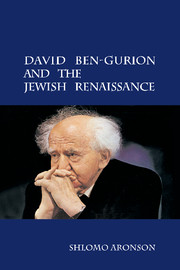Book contents
- Frontmatter
- Contents
- Preface and Acknowledgments
- Introduction
- 1 The Intellectual Origins of Ben-Gurion's Zionism
- 2 The Holocaust and Its Lessons
- 3 Ben-Gurion between Right and Left
- 4 Ben-Gurion and the Israel Defense Forces – From Formation to the Suez-Sinai Campaign of 1956
- 5 From the 1956 War to the “Lavon Affair”
- 6 From the “Lavon Affair” to the Six Day War
- Epilogue: The Renaissance That Waned and Its Leader
- Archives
- Interviews
- Abbreviations
- Notes
- Published Sources
- Name Index
- Ben-Gurion Subject Index
6 - From the “Lavon Affair” to the Six Day War
Published online by Cambridge University Press: 01 March 2011
- Frontmatter
- Contents
- Preface and Acknowledgments
- Introduction
- 1 The Intellectual Origins of Ben-Gurion's Zionism
- 2 The Holocaust and Its Lessons
- 3 Ben-Gurion between Right and Left
- 4 Ben-Gurion and the Israel Defense Forces – From Formation to the Suez-Sinai Campaign of 1956
- 5 From the 1956 War to the “Lavon Affair”
- 6 From the “Lavon Affair” to the Six Day War
- Epilogue: The Renaissance That Waned and Its Leader
- Archives
- Interviews
- Abbreviations
- Notes
- Published Sources
- Name Index
- Ben-Gurion Subject Index
Summary
The 1960 Affair and the 1961 General Elections
Just as Lavon was reviving the Affair in May 1960, another grave crisis broke out and eclipsed the foreign and defense policies – which were doing well until then – of Ben-Gurion and his aide, Shimon Peres: French President Charles de Gaulle secretly advised Israel that he had decided to abrogate the 1957 accord relating to the construction of the reactor in Dimona. Thus, as the clouds of the Affair were threatening them domestically, Ben-Gurion and Peres (the latter being Lavon's main target) were preoccupied with the other crisis, which was concealed from the public eye and became widely known only years later.
The only public expression of internal controversy over Dimona was sounded by the so-called Public Committee for Nuclear Disarmament in the Middle East, headed by Professor Yeshayahu Leibowitz and Eliezer Livne. The latter had been an important activist in Mapai in the 1930s and 1940s but had been ousted from the party before the crisis due to allegations of lifestyle improprieties. The real problem, however, seemed to be his close proximity to the American Embassy in Tel Aviv; since his ouster, he had been busying himself with apocalyptic public lamentation over the demise of Israel's pioneering and egalitarian spirit as a result of the German reparations. Another source of incessant personal incitement against Ben-Gurion was Uri Avnery's Haolam Hazeh.
- Type
- Chapter
- Information
- David Ben-Gurion and the Jewish Renaissance , pp. 283 - 348Publisher: Cambridge University PressPrint publication year: 2010



